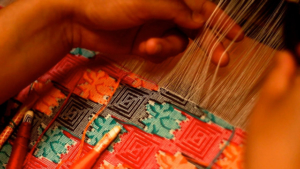How Freeset is Setting Women Free in India

At the age of 13, Kondola became the tenth wife to an older man and a servant in her in-laws’ house. Shortly after, she was tricked, sold and forced into prostitution in Sonagachi, Kolkata. She was forced to work in order to send money back to her family, who lived in Murshidabad, a high-risk district of West Bengal for human trafficking. Her future looked incredibly bleak. That was until she started a conversation with Annie and Kerry Hilton on the street. Along with twenty other brave women, she took the step to leave the sex trade business that she was unjustly forced into and began a sewing job with Freeset.
How Did This Organization Begin?
In 1999, Kerry and Annie Hilton left New Zealand and moved to Kolkata, signing for an apartment in the middle of the day. To their surprise, by nightfall, they discovered they had moved into one of Asia’s largest red-light areas, Sonagachi, and their neighbors were women who were forced into prostitution. They began building relationships with the women around them, including Mina, a woman who shared a similar past to many others, was advocating for new employment opportunities to help. Head of In-Country Communications, Sophie Bond, told The Borgen Project, despite the fact that “the Hiltons had no experience in manufacturing or business”, they were determined to be compassionate and trustworthy employers who could offer training and a secure job to these women, “to bring real change and freedom”.
Human Trafficking in India
Human trafficking in India is still a prevalent issue that the government must tackle. Two-thirds of the population live in poverty, with 68.8 percent living on less than two dollars per day. A small percentage of the population has benefited from the recent economic boom, in which 133 million Indians rose out of poverty between 1994 and 2012, yet there has been a steady increase in trafficking and violence, with almost 20,000 women and children trafficked in 2016. Victims usually belong to poor families in rural areas, with 70 percent of trafficking victims being members of the Dalit class of the caste system, among the most disadvantaged socio-economic groups in India. Members are prone to vulnerabilities and the pressures of survival make them easy targets to trick with false promises of repaid debts and money for their families. Women are the most vulnerable as social pressures have confined them to the domestic sphere, resulting in having a lack of education and literacy. They are also prevented from any justice or equality, further subjecting them to human rights abuses.
Freeset Today
Today, Freeset makes about 50,000 t-shirts and 240,000 bags per year. All staff members earn wages, with entry-level staff earning slightly more than the average garment maker in West Bengal. The designs are made by the women themselves, as well as by those who have volunteered at the organization. The organization typically sells in bulk orders to larger businesses looking to add their own logos to the merchandise. Bond shared that currently, about 200 women are employed and 30 men. In most cases, each woman supports at least three other family members and share eerily similar, yet simultaneously unique stories of being forced into prostitution by trafficking and poverty.
Freeset Offers Counseling
Tamar, an organization funded by the Freeset Trust, is a means of holistic care in each community. Bond told The Borgen Project, “Tamar is there to help with life skills and supporting women in their new path”. Several of the Tamar staff members are trained in Trauma-informed care, which is a huge part of the lives of the women working at Freeset. “For many of them, traumatic experiences–in the sex trade, as victims of trafficking, in domestic violence–have left deep mental and emotional (not to mention physical) scars. Counselling can help a woman to understand her own behaviors and reactions, as a result of the trauma she has experienced, and give her the tools to integrate into the workplace, and ‘normal’ society”. Additionally, as of 2016, Freeset has been awarded Fair Trade Guaranteed status by the World Fair Trade Organization (WTFO).
What is the World Trade Organization?
Home of Fair Trade Enterprises, this organization recognizes those who are empowering their staff to alleviate poverty. The goal of the WTFO is to transform communities by empowering women, practicing sustainable methods, and applying a community concept to trade those who are typically exploited by larger corporations.
What is Fair Trade?
Fair Trade has become an increasingly integral part of poverty alleviation, as it now impacts about one million livelihoods, with 74 percent of those being women. In fact, 54 percent of senior roles in fair trade organizations are held by women. Fair Trade policies aim to help empower people to combat poverty, strengthen, and take control of their own lives.
What Is The Government Doing To Help?
In India today, women constitute about 14 percent of the total entrepreneurship. However, the lack of equal access to education, employment, labor, and sexual violence hinders further advancements. The government has struggled to combat the issue of human trafficking, as it has been so widespread. Currently, it is looking toward crime prevention and harsher penalties for child prostitution and forced marriage, as well as improvements to protect victims. However, India’s vast landscape and corruption of officials still pose as obstacles that the government must overcome to further the progress throughout the country.
Check this out to see how you can get involved with Freeset: https://freesetglobal.com/volunteer/
– Adya Khosla
Photo: Flickr
